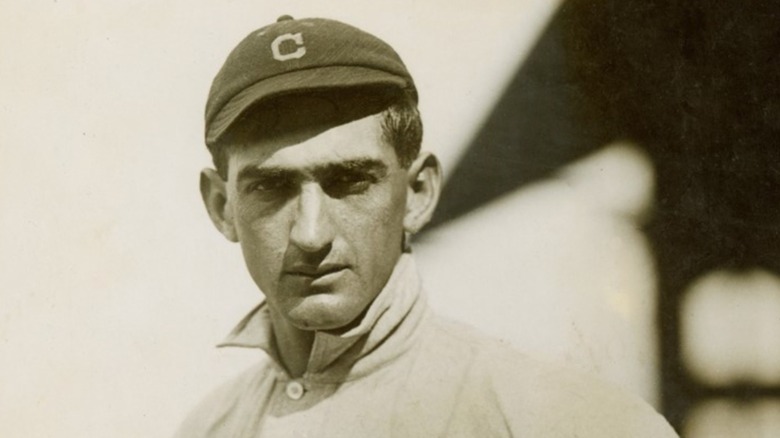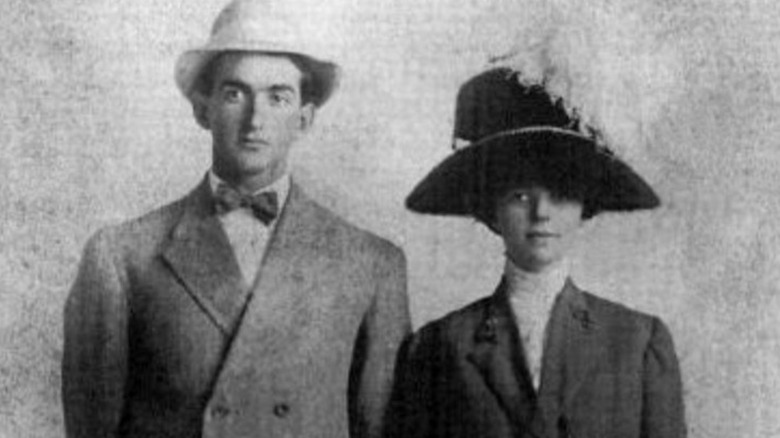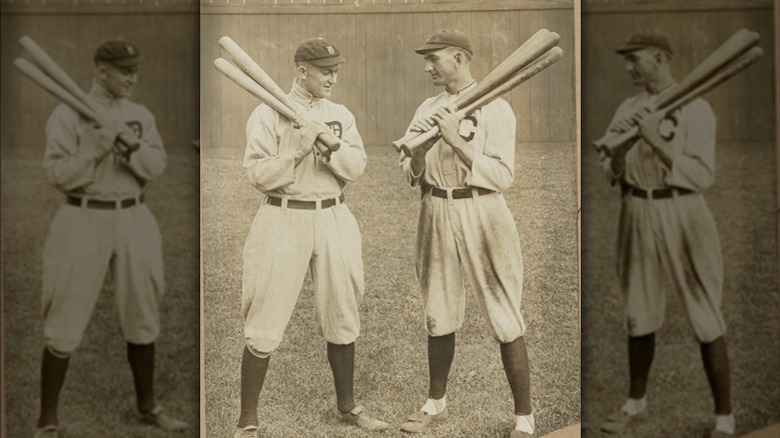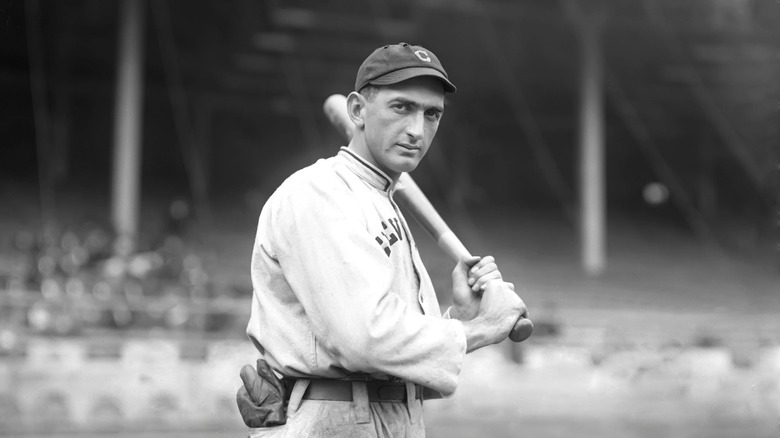Here's Who Inherited Shoeless Joe Jackson's Money After He Died
We may receive a commission on purchases made from links.
One of the more tragic stories to come from the early years of Major League Baseball is that of "Shoeless" Joe Jackson. A sickly child, he grew up in extreme poverty in a South Carolina mill town, only to find that his prowess with a baseball bat could be his ticket out.
Unfortunately for Jackson, he wound up playing for the Chicago White Sox, which were, at the time, owned by legendary cheapskate Charlie Comiskey. So tightfisted was Comiskey that he even made his players wash their own dirty uniforms in order to cut back on laundry bills. Of course, Comiskey also paid his players significantly less than other baseball owners — and this was a time when many players had day jobs in the off-season and side businesses to make ends meet. While his salary paled compared to what professional athletes get paid these days, it was still enough to live comfortably.
Jackson and a handful of his teammates were bribed to throw the 1919 World Series — the "Black Sox scandal" — and though Jackson took their money, whether or not he actually contributed to throwing the series is debated to this day. Regardless, he was banned from baseball and spent the remainder of his career playing for and managing various semi-pro teams under assumed names. When his baseball days were over, he and his wife owned various businesses, including a dry cleaners, a restaurant, and a liquor store, before he died in 1951 at the age of 64.
How much money his estate was worth at the time is unclear. It's likely he invested some of his baseball money in his modest business ventures. Whatever he had, he left it all to his wife of 43 years, Katie Wynn Jackson.
Shoeless Joe and Katie never had kids
In 1908, Joe Jackson turned 21 and was playing for the Philadelphia Athletics in his first year in the majors. That year, he married the love of his life, Katie Wynn, who was just 15 at the time. A newspaper account provided by the Shoeless Joe Jackson Museum, making clever use of baseball puns, described the nuptials: "Joe Jackson, the popular center fielder of the local team made the greatest home run of his career on Sunday. The home run was made on Cupid's diamond and the victory was a fair young lady. On Sunday afternoon at 4:30 o'clock, Joe was married to Miss Kate Wynn." Katie stood by her husband through thick and thin, managing his businesses when he was on the field and having his back during and after the Black Sox scandal.
Jackson was the oldest of eight siblings, but he and Katie never had any children. Shoeless Joe's great-great-great nephew, also named Joe Jackson, played minor league baseball as recently as 2017, and even sometimes caught hell for having the same name as his legendary ancestor; fans would often jokingly shout at him to take his shoes off, as if it were the first time he'd ever heard that joke.
The Black Sox Scandal changed Jackson's life forever
While White Sox owner Charlie Comiskey was known to be frugal, Shoeless Joe Jackson wasn't a pauper. The Society for American Baseball Research reported that by 1919, Jackson was earning the most he ever had at $1,439 per month. Adjust for inflation, today that would be $27,977. He signed a contract for $8,000 ($155,537 in 2025) for the 1920 season, but that never came to fruition due to the Black Sox Scandal. Jackson and several others confessed to taking a bribe in October 1920. Jackson was offered $20,000 (nearly $390,000) to help sabotage the World Series, but only ended up getting $5,000, or nearly $97,000 when adjusted to current rates.
After he was blackballed from baseball, Jackson returned to the Deep South and opened up and managed various businesses, including, at one time, a dry cleaning service and a liquor store. Legend has it that one day, years after both of their careers had ended, Baseball Hall of Famer Ty Cobb (pictured with Jackson) stopped by Jackson's Greenville, South Carolina liquor store and picked up a bottle. Though both men seemingly recognized each other, neither said anything until Cobb finally broke the ice and asked why Jackson didn't acknowledge him. "Sure, I know you, Ty, but I wasn't sure you wanted to know me. A lot of them don't," Jackson reportedly said.
As he closed in on his twilight years, Jackson did what a lot of people of his age did, and sat down with his lawyer to write his will, finalized on March 23, 1951, just a few months before he died of a heart attack. The document is brief; he named his widow, Katie, the executor of his estate and its sole beneficiary. Before she died in 1959, she left a portion of their estate to the American Heart Association.
Shoeless Joe's legacy
Though he played over 100 years ago, and died more than 70 years ago, Shoeless Joe's shadow is still cast over the world of baseball. In what may be the most memorable example of him informing popular culture, his story is part of the narrative in the 1989 film "Field of Dreams," in which Jackson was portrayed by Ray Liotta. In "Eight Men Out," a film about the Black Sox scandal, D.B. Sweeney played Jackson.
Moving from the realm of fiction and into the realm of nonfiction, there had long been the matter that Shoeless Joe, who went down in history as a corrupt athlete, was banned from baseball and, as such, couldn't be inducted into the Baseball Hall of Fame. That changed in May of 2025 when baseball commissioner Rob Manfred announced that controversial baseball players who were on the ineligible list for the Baseball Hall of Fame would be taken off the list after they died, making Jackson a candidate for the honor. The next time ballots will be cast is in December 2027, and Jackson would need to get 12 out of 16 votes, but if he does, he could be enshrined in Cooperstown in 2028.



